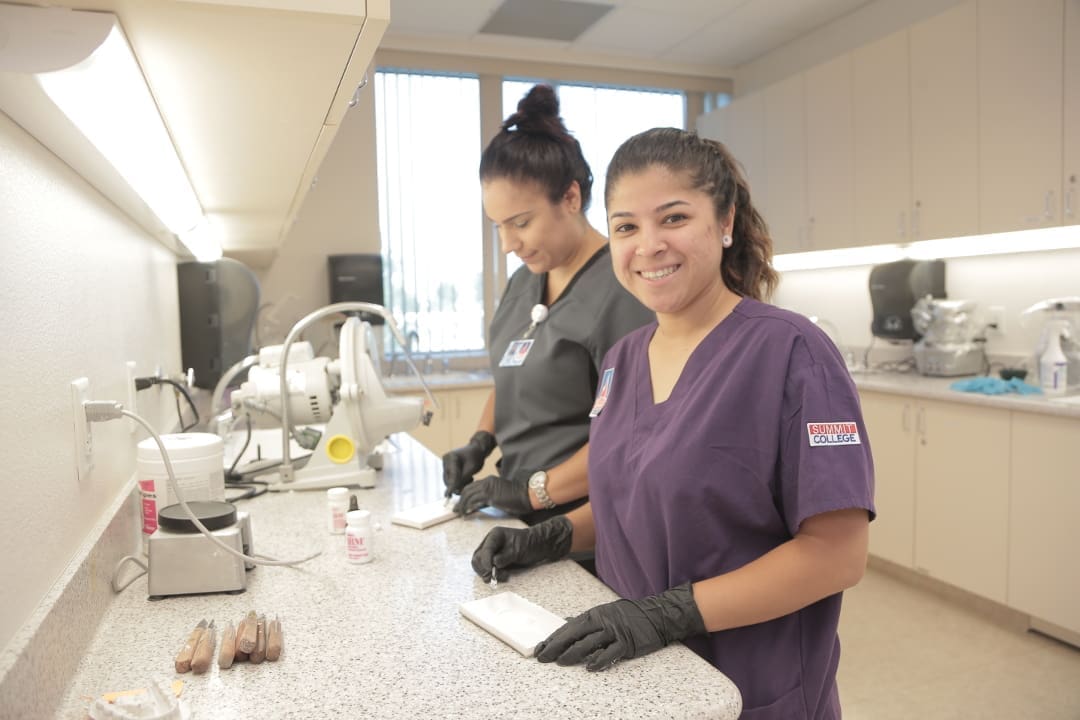Do you want to get to work in the healthcare field without spending four years and boatload of money to do so? A vocational nursing program might just be for you. Read more about the advantages below.
You might be wondering what exactly a vocational nurse is. The California Board of Vocational Nurses and Psychiatric Technicians (BVNPT) describes a vocational nurse as “an entry-level health care provider who is responsible for rendering basic nursing care.”
As a vocational nurse, you will work alongside doctors and registered nurses in many different medical settings. You’ll perform tasks like taking blood pressure, changing bandages and maintaining patients’ health records.
Depending on the state in which you are employed, a vocational nurse’s role may be vastly different than LVNs in other states.
Vocational nurses (VNs) and licensed practical nurses (LPNs) perform the same duties. The titles can be used interchangeably and the version used typically depends on the state in which you study or practice.
There are many perks of becoming a vocational nurse. We’ve highlighted a few of the many upsides of studying to become and working as a vocational nurse.
Get to Work Sooner
One advantage that LVN students have over BSN students is that they enter the healthcare workforce sooner. LVN programs can typically be completed in 12 and 20 months, whereas Bachelor of Science of nursing (BSN) programs take more than twice that time. And even if you have stellar grades, there are a limited number of spots at four-year colleges and you are not guaranteed to get one of them.
Save Money on Education

Another upside to choosing the LVN route compared to pursuing a BSN degree is the monetary cost. As you can probably infer, spending less time in school means spending less money to attend school.
Depending on the school, a four-year BSN degree costs anywhere between $40,000 and $200,000. Most VN programs, on the other hand, typically run between $20,000 and $40,000.
Job Outlook
The United States Census projects that number of people in the United States who are age 65 or older, currently over 46 million, will more than double by 2060. The number of people with chronic illnesses, such as obesity and diabetes, is also on the rise. According to the National Council on Aging, “about 80 percent of older adults have at least one chronic disease, and 68 percent have two.”
These factors and more have created a need for nurses that is at an all-time high. The Bureau of Labor Statistics (BLS) projects employment for licensed practical and vocational nurses to increase 16 percent through 2024.
Job prospects are expected to be even more favorable for candidates who “are willing to work in rural and medically underserved areas,” according to the BLS.
While the national employment of vocational nurses is expected to rise at a greater rate than the average of other occupations, the outlook in California is even more promising. The Occupational Information Network (O*NET) anticipates that LVN employment in California will increase by 21 percent during that same period.
Multitude of Places to Work
Combined with stable starting salaries and promising job outlook, LVNs also have a variety of places where they can work. The many places vocational nurses are employed include:
- Physician’s offices
- Rehabilitation facilities
- Hospitals
- Nursing homes
Vocational nurses are often employed by insurance companies or for insurance purposes. In such instances, these nurses conduct examinations of individuals to protect employers against fraudulent workers’ compensation cases.
Find Your Passion
Vocational nursing programs tend to have well-rounded curricula and allow students to gain exposure to many arenas of medicine. These include pediatrics, obstetrics, pharmacology or more, depending on the program.
Exposing students to a variety of subjects prepare them to be more complete LVNs. They develop valuable skill sets that will be put to work in the healthcare field. Not only that, it allows them to find which area of medicine they are most passionate about. This gives them the option to specialize and further their education at a later time should they choose to do so.
Working as a vocational nurse can be a stepping stone to a more specialized career in the medical field.
Helping People

There are fewer feelings more satisfying than knowing you helped another person or helped make them feel better. Like any other professional in the healthcare field, vocational nurses enjoy helping patients.
LVNs not only perform routine procedures like inserting catheters, but they also listen to a patient’s concerns. Showing compassion and understanding is often just as important as the services performed by doctors.
Education is the first step
The various perks of becoming a vocational nurse might sound great, but it all starts with your education. Completing a quality LVN program can help aspiring LVNs stand out during their quest for healthcare employment.
Summit College’s Vocational Nursing program is one of the largest LVN programs in California and is accredited by the California Board of Vocational Nurses and Psychiatric Technicians. Students who enroll in Summit College’s LVN program receive a well-rounded nursing education that allows them to provide optimum care after licensure.
Summit College offers both full-time and part-time enrollment in its LVN program, providing students with flexibility around their busy lives.
The full-time program offers classes during the day and can be completed in 12 months. The part-time program offers classes during evenings and weekends to accommodate students who work other jobs. Students in the part-time program complete it in 18 months.
Summit College offers the Vocational Nursing program at its Colton Campus.
Summit’s LVN program consists of both theoretical and clinical components. Once these are completed, students receive a certificate from the program. The course work at Summit prepares students not only for real-world healthcare positions, but also for passing the National Council Licensure Examination (NCLEX).
All vocational nurses in the United States are required to take and pass the National Council Licensure Examination (NCLEX). The exam assesses the core competencies required by all candidates to fulfill the role of a vocational nurse safely and effectively. Each state in the U.S. has at least one board responsible for the licensure of nurses. The licenses required by the state boards of nursing help ensure public safety.
Summit College offers plentiful resources to its vocational nursing students to help them prepare for the NCLEX. Such resources include full-time NCLEX tutors and NCLEX review classes, which are offered for free as part of enrollment in the program. In some cases, students may be eligible for financial assistance with first-time application costs, in addition to other fees associated with acquiring a vocational nursing license.
Summit College also offers students career assistance beyond acquiring their vocational nursing license, including resume help, mock interviews and externships. These resources help LVN students capitalize on lucrative entry-level healthcare jobs.
As far as financing your education while you’re in school, Summit has you covered. They offer a variety of different financing and payment options. There is also financial aid available to those who qualify. All you have to do is fill out the Free Application for Federal Student Aid (FAFSA).
Vocational nurses start making a difference and saving lives sooner than other nurses. The need for nurses will only continue to grow as millions more Americans reach age 65 and beyond. Every LVN will make a difference in combatting the need for healthcare professionals.
All of the benefits of becoming a vocational nurse can be yours. What are you waiting for? Discover the Summit Difference. Get started today at summitcollege.edu.
Tags: Allied Health, Healthcare, VN



